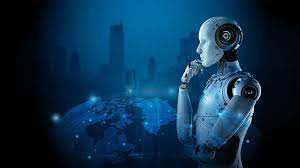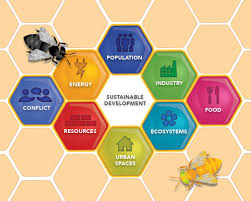The Rise of Artificial Intelligence: Transforming the Future
Artificial intelligence (AI) is no longer a concept confined to science fiction. It has become an integral part of our daily lives, influencing everything from how we work to how we interact with technology. As AI continues to evolve, its impact on various sectors becomes increasingly profound.
What is Artificial Intelligence?
At its core, artificial intelligence refers to the capability of machines to mimic human cognitive functions such as learning, problem-solving, and decision-making. Through sophisticated algorithms and vast datasets, AI systems can analyze information, recognize patterns, and make informed decisions with minimal human intervention.
Applications of AI Across Industries
AI has found applications in numerous industries, revolutionizing traditional processes and creating new opportunities:
- Healthcare: AI-powered tools assist in diagnosing diseases more accurately and swiftly than ever before. Machine learning algorithms analyze medical images and patient data to identify potential health issues early on.
- Finance: In the financial sector, AI algorithms are employed for fraud detection, risk management, and personalized customer service through chatbots.
- Manufacturing: Automation driven by AI enhances production efficiency by predicting maintenance needs and optimizing supply chains.
- Retail: Personalized shopping experiences are enabled through AI by analyzing customer behavior and preferences to recommend products.
- Agriculture: Precision farming utilizes AI for crop monitoring, pest control, and yield prediction to improve productivity while reducing environmental impact.
The Ethical Considerations
The rapid advancement of AI technologies also raises ethical concerns that need addressing. Issues such as data privacy, algorithmic bias, job displacement due to automation, and the need for transparency in AI decision-making are at the forefront of discussions among policymakers and technologists alike.
The Need for Responsible AI Development
The development of ethical guidelines is crucial to ensure that AI technologies benefit society as a whole. This includes ensuring diversity in training datasets to minimize biases and implementing robust privacy measures to protect user data. Collaboration between governments, industry leaders, and researchers is essential in creating a framework for responsible AI use.
The Future of Artificial Intelligence
The potential for artificial intelligence is vast. As technology continues to advance at a rapid pace, it will undoubtedly reshape industries further and introduce new paradigms in how humans interact with machines. The key lies in harnessing this power responsibly while maximizing its benefits for humanity.
As we move forward into an era increasingly defined by intelligent systems, understanding the implications of artificial intelligence becomes imperative not only for technologists but also for society at large. By fostering an informed dialogue about its possibilities and challenges today, we pave the way towards a future where technology serves as an ally rather than an adversary.
Understanding Artificial Intelligence: Common Questions and Answers
- Are humans artificially intelligent?
- What are four types of artificial intelligence?
- What is artificial intelligence with example?
- What is meant by artificially intelligent?
- Is there any artificial intelligence?
- What is the best definition of artificial intelligence?
- What is an example of artificial intelligence?
Are humans artificially intelligent?
The question “Are humans artificially intelligent?” often arises from a misunderstanding of what artificial intelligence (AI) entails. Artificial intelligence refers to the simulation of human-like cognitive processes by machines, typically through complex algorithms and computational power. Humans, on the other hand, possess natural intelligence, which is characterized by consciousness, emotional depth, creativity, and the ability to learn from experience in a way that machines currently cannot replicate. While AI systems can process data and perform tasks with remarkable efficiency, they lack the innate qualities of human cognition. Therefore, humans are not artificially intelligent; rather, they are naturally intelligent beings who create and utilize AI technologies to augment their capabilities and improve various aspects of life.
What are four types of artificial intelligence?
Artificial intelligence can be categorized into four types based on their capabilities and functionalities: reactive machines, limited memory, theory of mind, and self-aware AI. Reactive machines are the most basic type, designed to perform specific tasks without storing past experiences or using them for future actions. Limited memory AI builds upon this by utilizing historical data to make decisions, which is commonly seen in technologies like self-driving cars. Theory of mind AI is more advanced and theoretical at this stage, as it involves understanding human emotions and beliefs to interact socially. Lastly, self-aware AI represents the pinnacle of AI development, where machines possess consciousness and self-awareness; however, this type remains largely speculative and is a subject of ongoing research.
What is artificial intelligence with example?
Artificial intelligence, often abbreviated as AI, refers to the simulation of human intelligence processes by machines, typically through the use of algorithms and data. One example of artificial intelligence is virtual assistants like Amazon’s Alexa or Apple’s Siri, which utilize natural language processing and machine learning to understand and respond to user queries. These AI-powered assistants can perform tasks such as setting reminders, answering questions, playing music, and controlling smart home devices, showcasing the capabilities of artificial intelligence in enhancing user experiences through intuitive interactions.
What is meant by artificially intelligent?
Artificially intelligent refers to the capability of machines or software systems to perform tasks that typically require human intelligence. This includes a wide range of functions such as learning from data, recognizing patterns, understanding natural language, and making decisions. AI systems achieve these capabilities through the use of algorithms and models that process large amounts of data to simulate cognitive processes. The goal of artificial intelligence is to create systems that can operate autonomously, adapt to new situations, and improve their performance over time without explicit human intervention. By mimicking human-like cognitive functions, AI has the potential to transform various industries and enhance everyday life in numerous ways.
Is there any artificial intelligence?
Yes, artificial intelligence (AI) is very much a reality today and is actively integrated into numerous aspects of daily life and various industries. AI encompasses a range of technologies that enable machines to perform tasks that typically require human intelligence, such as understanding natural language, recognizing patterns, and making decisions. Everyday examples include virtual assistants like Siri and Alexa, which use AI to understand and respond to voice commands, and recommendation algorithms on platforms like Netflix and Amazon that suggest content based on user preferences. In industries such as healthcare, finance, and manufacturing, AI is used to improve efficiency, enhance decision-making processes, and drive innovation. As AI technology continues to advance, its presence will likely become even more pervasive in society.
What is the best definition of artificial intelligence?
Artificial intelligence (AI) can be best defined as the branch of computer science that focuses on creating systems capable of performing tasks that typically require human intelligence. These tasks include learning, reasoning, problem-solving, perception, and language understanding. AI systems utilize algorithms and large datasets to simulate cognitive processes, enabling them to make decisions, recognize patterns, and adapt to new information. While there are various definitions of AI, the essence lies in its ability to mimic or enhance human thought processes through advanced computational techniques. This adaptability and capacity for improvement distinguish AI from traditional programming methods.
What is an example of artificial intelligence?
Artificial intelligence encompasses a wide range of applications that have become integral parts of our daily lives. One common example of artificial intelligence is virtual assistants like Amazon’s Alexa, Apple’s Siri, or Google Assistant. These AI-powered systems use natural language processing and machine learning algorithms to understand and respond to user commands, whether it’s setting reminders, answering questions, or controlling smart home devices. Virtual assistants showcase how artificial intelligence can enhance convenience and efficiency by interpreting human language and executing tasks autonomously.




